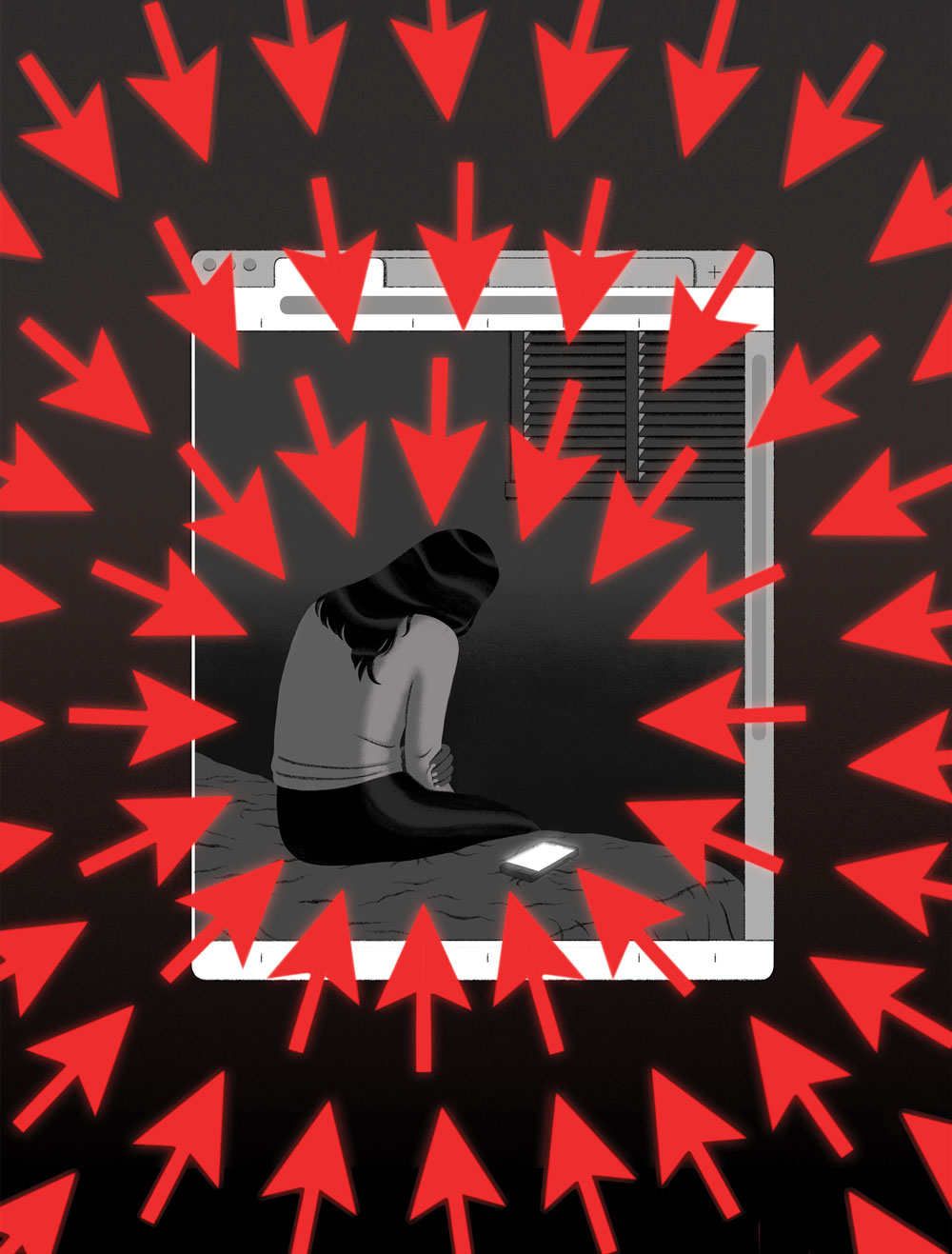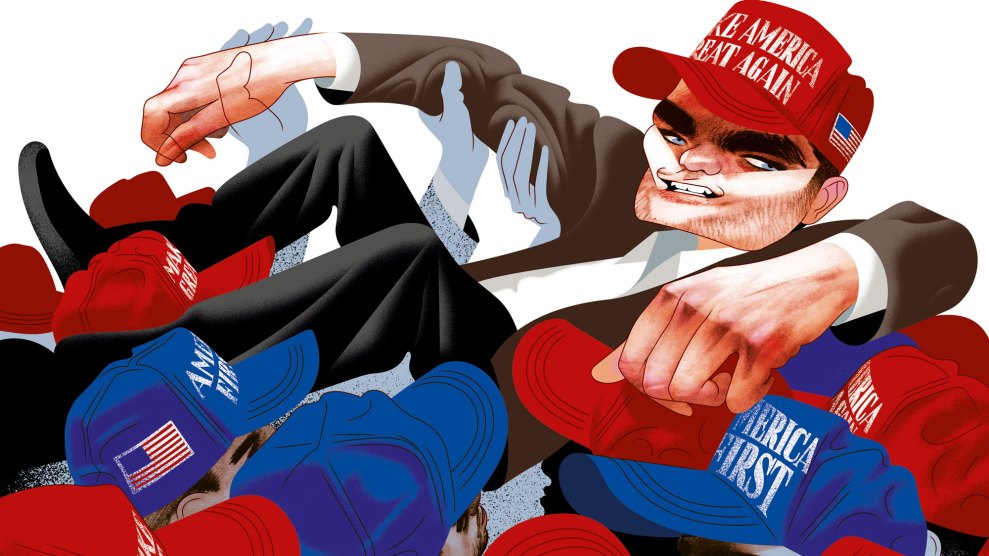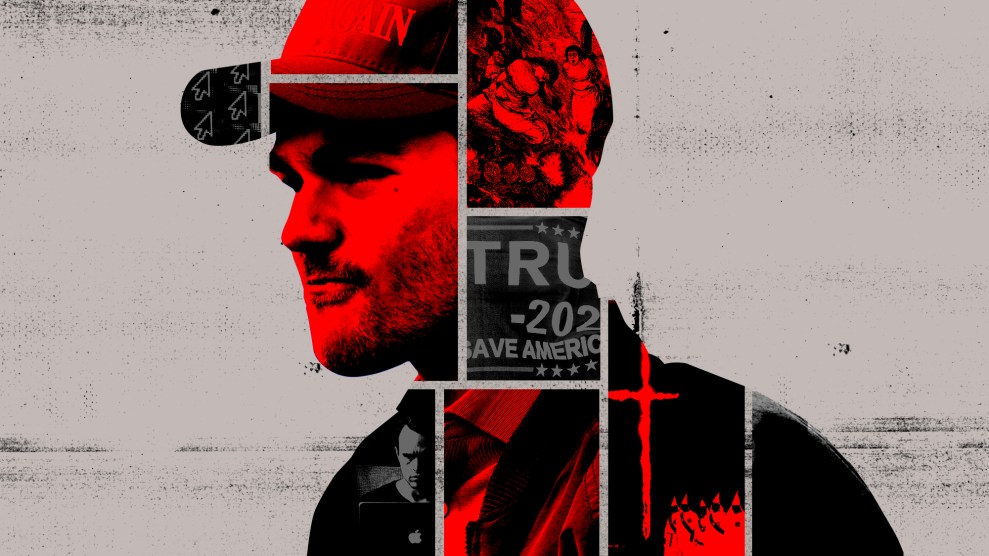If you or someone you care about may be at risk of suicide, call or text the National Suicide Prevention Lifeline, a free 24/7 service that offers support, information, and local resources: 988.
Most websites aren’t known for having a “kill count.” Kiwi Farms is. Its victims reportedly include Julie Terryberry, who in 2016 took her life after being targeted by users of the site. Two years later, after years of harassment from Kiwi Farms trolls, Chloe Sagal lit herself on fire in a public park. In June 2021, an American video game developer based in Japan, named David Ginder, took their life amid a campaign of Kiwi Farms abuse.
For more articles read aloud: download the Audm iPhone app.
Kiwi Farms is a forum similar in design to 4chan or 8chan, where anonymous posters gather. But instead of just spreading noxious discourse, Kiwi Farms users turn to the site to plan and coordinate. They work to make the lives of their targets a living hell. Their tactics include doxxing, SWATing, defaming, encouraging self-harm, and stalking, online and sometimes off.
Kiwi Farms harvests anguish. It thrives on pain and revels in death. Users of the innocuously named forum prey on the vulnerable and marginalized—people who are transgender, neurodivergent, disabled, financially struggling—with persistent and twisted harassment campaigns. Despite its penchant for destroying lives, Kiwi Farms has been mostly overlooked by the media for much of the site’s existence. That is partly because of who it attacks, but also because reporters are wary of becoming targets themselves. The users call their victims “lolcows” because their pain can be milked for laughs. The group made its purpose clear on its Twitter page before it was taken down: “Gossip and exploitation of mentally handicapped for amusement purposes.”
Kiwi Farms users deploy slightly different tactics for various victims, but the rough beats are the same. First, the group assembles extensive dossiers. Then they use the information (some true, some contorted, some fabricated) to torment their targets.
When Sagal posted about her suicidal thoughts, Kiwi Farms users sent private messages urging her to kill herself, a friend said. When posters learned that Terryberry, an 18-year-old with learning disabilities, used the internet to make friends, they worked to get her social media accounts shut down while mocking her mental health struggles. They relentlessly tormented Ginder for being nonbinary. One thread went on for more than a dozen pages.
“I’ve been bullied, ridiculed, and humiliated my entire life,” Ginder explained in their online suicide note. “I could only just tolerate it with heavy depression when it was 4chan. But Kiwi Farms has made the harassment orders of magnitude worse.”
Users gleefully imagined Ginder’s death: “Here’s hoping for a +1 to the kiwi kill count”; “Bruh I hope he streams his suicide. Quote me in the articles”; “Don’t give in [and] delete the thread. Everyone will get a point on their counter if he does it, and I only need two more to get free a milkshake.” Such discourse is typical. In threads about other targets, Kiwi Farms users have joked, “See the only problem with making a thread on a tranny post mortem is that we can’t kill them a second time,” and “hope the fat cunt strokes out and dies tbh, stop wasting my fucking taxes.”
When journalists have covered Kiwi Farms, they’ve tended to label it a far-right forum, which is true but incomplete. Its members both love and detest figures like former President Donald Trump and white nationalist Nick Fuentes. Not necessarily because users disagree with either, but because both can be “cringe”—online parlance for corny. Kiwi Farms posters have ridiculed trans Twitch streamers, and troubled teens, and even Rep. Marjorie Taylor Greene. They are deeply reactionary—many hate women, people of color, neurodivergent people, queer people—but they torment them as much for the need of a soft target as a political project.
“They were systematically trying to cause suicides,” Yonah Gerber, an archivist in the video game industry who has spent the better part of a decade advocating for Kiwi Farms to be shut down, told me. “I was almost another—because I tried to kill myself twice.”
The first time most people heard of Kiwi Farms was in August 2022, when popular trans Twitch streamer Clara Sorrenti said she had a SWAT team sent to her house, a favorite tactic of Kiwi Farms users and other serial harassers. “I was woken up by police officers and saw the assault rifle pointed at me,” Sorrenti explained in a YouTube video. “I thought I was going to die.” (Later that month, a Kiwi Farms user also SWATed Rep. Greene, according to a police report.)
Before then, Kiwi Farms victims had tried to fight back, with little success. But Sorrenti (whose handle is Keffals) had leverage: her large, passionate fanbase—nearly 150,000 followers on Twitter, more than 50,000 on Twitch. She created the #DropKiwiFarms campaign and asked her supporters—who can be as fervent as K-pop stans—to pressure web services and security provider Cloudflare to boot Kiwi Farms as a client, effectively deplatforming the website by inhibiting its ability to fully function. Sorrenti’s followers made sure that every time she tweeted about Kiwi Farms victims, or provided updates on the campaign, her posts got thousands of likes and retweets. National news stories soon followed. For weeks, Cloudflare did not respond. Then, on September 3, the company’s CEO, Matthew Prince, wrote in a blog post that it had “taken steps to block [Kiwi Farms] content from being accessed through our infrastructure.” Major outlets declared the death of “the worst place on the web.” “The campaign is over. We won,” Sorrenti said on September 5.
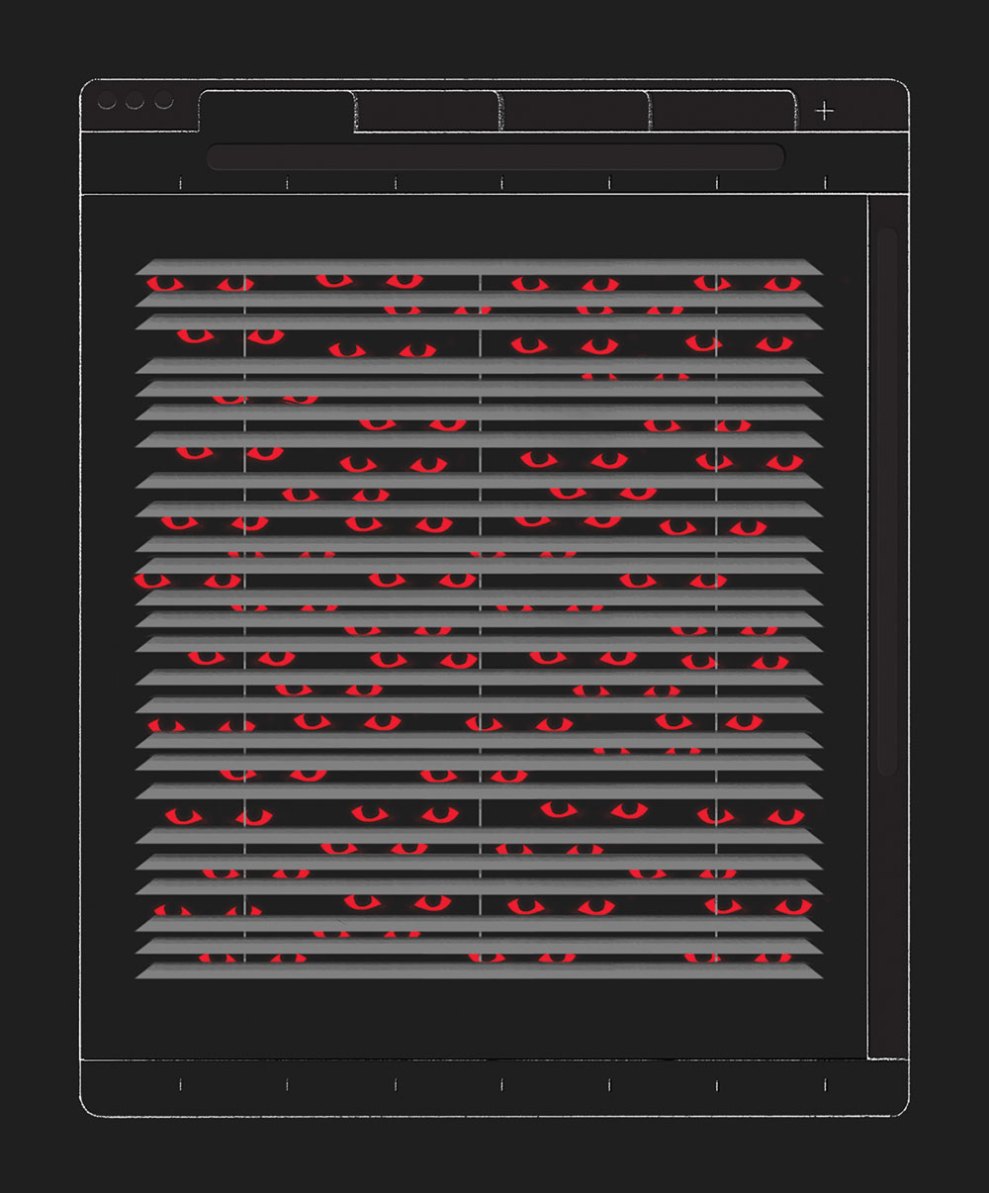
But nothing dies online, not completely. Kiwi Farms victims had already seen this firsthand, as shards of ephemeral information—photos, stray thoughts, personal missives—were built into portfolios of abuse by strangers. Kiwi Farms’ founder and its users are extremely committed to keeping the website alive; it pops back into existence occasionally as it fights to find a secure host. Posters congregate on Telegram. They move between Discord servers. But whatever happens to the forum itself, the strategies of internet torture that Kiwi Farms honed have spread far beyond it.
Kiwi Farms is the dystopian endgame of those who think that doing anything short of pulling the trigger themselves is “free speech.” The questions posed by Kiwi Farms’ rise and apparent fall are increasingly urgent since Elon Musk bought Twitter, restoring thousands of accounts once banned for hate, harassment, and disinformation. Kiwi Farms is what happens when the internet democratizes everything, including the vile whims of those who want to inflict their wrath on people struggling even more than they are.
The story of Kiwi Farms is far from over. Despite being dropped by Cloudflare, Kiwi Farms could still gain a stable foothold. Even if it doesn’t, the site and its users have defined internet culture for years to come. To understand that legacy requires going back to the beginning. And like so many internet origin stories, it starts with an angry young man.

Josh Moon, the 30-year-old baby-faced troll king who founded Kiwi Farms a decade ago, lives with his mom in Pensacola, Florida. His story is fragmented, mostly buried in years of disorganized forum entries. He posts under the username “Null.” His mother, who supports him, is a former nurse and now a real estate agent. He has dark brown hair. He does not appear to have a job.
Moon’s rise can be traced back to Something Awful, an influential forum that profoundly shaped online culture by crafting an argot that was weird, funny, and cruel. In 2007, Something Awful users began posting about an otherwise unknown transgender, autistic, and very online 25-year-old in central Virginia named Christine Weston Chandler. Chandler was unemployed and struggling socially. Tracking her on the forum (a project that 4chan took part in, too) became a form of morbid, schadenfreude-laced entertainment. Chandler’s social difficulties were so public and obvious that even the stereotypical nerd on 4chan or Something Awful could feel superior by comparison. “This guy used to leave ‘business cards’ at my school’s library where he would hang out for hours looking for a ‘boyfriend-free girl.’ This is how I first learned of him,” a Something Awful user wrote in one of the earliest posts about Chandler. “From here, I developed something of an obsession, culminating last summer when I made a special trip to a gaming store and local hangout where he had posted he would be. He was every bit as aspergic as I had imagined.”
Moon took a heavy part in the Chandler bashing. He and the site’s users fixated in particular on a diary Chandler posted called “Love Quest.” In it, Chandler chronicled her experiences approaching women on the campus of Piedmont Virginia Community College with a sign that said “Seeking an 18-21-Year Old Single Female Companion.” (She was rumored to have been banned from campus as a result.) Moon also lampooned the amateur internet comic series Chandler created, “Sonichu”—a mashup of Sonic the Hedgehog and Pikachu.
Accounts vary, but sometime around 2008, the group made a wiki called CWCki (pronounced “quickie,” and playing on “wiki” and Christine Weston Chandler’s initials) to exhaustively catalog Chandler’s life. Every time she posted, they did too.
The nascent group soon added other targets. As it grew, Moon took a more active role. In 2013, almost five years after they began to keep records on Chandler, he offered to buy a hosting service and publicly attach his name. “I’ve volunteered to support the forum with a true and honest domain name and an actual host that isn’t going to trash our happy home just because of whom it is centered around,” Moon wrote. (Moon named his hosting service “Final Solutions,” and later “1776 Solutions.”) In 2013, he and the group changed the name of the wiki to Kiwi Farms, purportedly to make fun of how lolcows with speech impediments pronounced “CWCki forum.”
Moon has called Kiwi Farms a “discussion forum” or a “comedy forum,” but from the beginning he helped set the tone of conversations that had a far more insidious undercurrent. His username shows up frequently in early threads. He uploaded screenshots of Chandler’s Facebook statuses, sometimes capturing them minutes after she wrote them, and dredged up her old blog posts. According to research compiled by SMAT (Social Media Analysis Toolkit), he mentioned the term “lolcow” more than 400 times, the fifth most of any user on the site.
Politically, Moon is a little all over the place, but generally he is far right: Moon has referred to President Obama as the “nigger in chief” and praised President Trump. Moon has been uncompromising in his commitment to preserving Kiwi Farms—even in the face of international pressure. After a gunman livestreamed his murderous rampage at a mosque in Christchurch, New Zealand, that killed 51 people in 2019, tech platforms—even 8chan—removed the video and the shooter’s screed from their sites. Moon refused.
“You do not have the clout to eradicate a video from the internet and you do not have the legal reach to imprison everyone whose [sic] posted it. If anyone turns over to you the information they’re asking for they’re not only cowards, but they’re fucking idiots,” he wrote in a public response to requests from New Zealand authorities.
Moon isn’t this bold offline. In 2016, Greta Martela, the co-founder of Trans Lifeline, a suicide prevention hotline for trans and gender-nonconforming people, was being hounded by Kiwi Farms. She found an address linked to Kiwi Farms—Moon’s mother’s house. Martela was driving through Florida already, she told me, so she decided to confront him. “His mom comes to the door, [and when I asked to speak with Joshua,] she said, ‘He’s not here. He’s in the Philippines.’” Shortly thereafter, Moon posted on Kiwi Farms that he had been “taking a shit”—not hiding—when she arrived. Regardless, Martela said Kiwi Farms’ harassment largely ceased after that. (Moon did not respond to a list of questions sent to him by Mother Jones.)
It was in their steady abuse of Chandler that Moon and the forum honed techniques that they’d come to use on scores of other people. As Margaret Pless reported in a 2016 New York magazine story, Kiwi Farms users would pose as journalists and contact “[Chandler’s] pastor, and her parents.” They pretended to be “former classmates, psychiatrists, potential business partners, and others, in the hopes these ruses [would] yield more confidential info” from those close to Chandler.
Kiwi Farms’ methods had an obvious influence on Gamergate, the sprawling right-wing, anti-feminist online harassment campaign that took place in 2014 and 2015. There were also some direct connections. Tech magazine Input found that Moon created a dedicated Gamergate.us email service. Patrick Klepek reported in Vice that Kiwi Farms was, along with 4chan, “arguably responsible for the most heinous of Gamergate’s actions.” Participants in Gamergate mimicked Kiwi Farms’ techniques: They doxxed their targets, threatened their lives, contacted their families, hacked their social media accounts, bombarded their phone lines, and tried to get them fired from their jobs.
The tactics pioneered by Kiwi Farms have also influenced QAnon-inspired crusades against hospitals treating trans children; Trumpers baselessly accusing a Texas butterfly sanctuary of human trafficking; and an anti-LGBTQ campaign spearheaded by Twitter account Libs of TikTok. Commentators and journalists often repeat the refrain that “everything is Gamergate” in response to such incidents. But it might be more accurate to say that everything is Kiwi Farms.

Even before Kiwi Farms set its sights on Victoria Darling in 2016, her life was hard. Darling (whose last name is a pseudonym that she uses publicly) had battled bouts of self-harm. In 2014, transphobes had attacked her as part of an online spat, doxxing her address. The abuse got to her. Darling landed at an inpatient mental health facility in Spokane, Washington. Homeless after being released, Darling called a friend living in Portland, Oregon. The friend said she could come stay with her.
“It was against my better judgment, but I felt I needed to do it,” Darling told me. At the time, she didn’t know her new roommate was being harassed by Kiwi Farms. Then, Darling became a target, too.
“They put out my deadname. They sent us literal shit through the mail. They stole a phone number that I had for over ten years. I think they sim-jacked me,” she recounted, describing a method of swiping a phone line. “I was suspended from Facebook because they were using my number to harass people. I have lost friends because of them. I’ve lost connections because of them. I can’t tell you how many close friends I’ve lost because of their lies and bullshit.”
Darling’s story is common. I spoke to multiple victims of harassment from Kiwi Farms users. One told me they made notecards so they wouldn’t lose their train of thought when their emotions inevitably overwhelmed them as we talked. Another, Alexandria Christina Leal, spoke slowly. They chose words carefully. “I was in financial precarity,” they began. Leal then paused and said deliberately, “During that time, I was living in a precarious situation. The goal was to kill me.”
Kiwi Farms users obsessively hunt their victims. When Sorrenti, the Twitch streamer known as Keffals, fled her home as the harassment campaign against her escalated, she posted a picture of her cat on a bed. Kiwi Farms users found her location and sent pizzas to her room, using her deadname. (Sorrenti assumes Kiwi Farms members cross-referenced the bedsheets with those of area hotels.) Other survivors described similar experiences; one wrote online about their suspicion that Kiwi Farms users researched floor tiling patterns to ascertain their whereabouts.
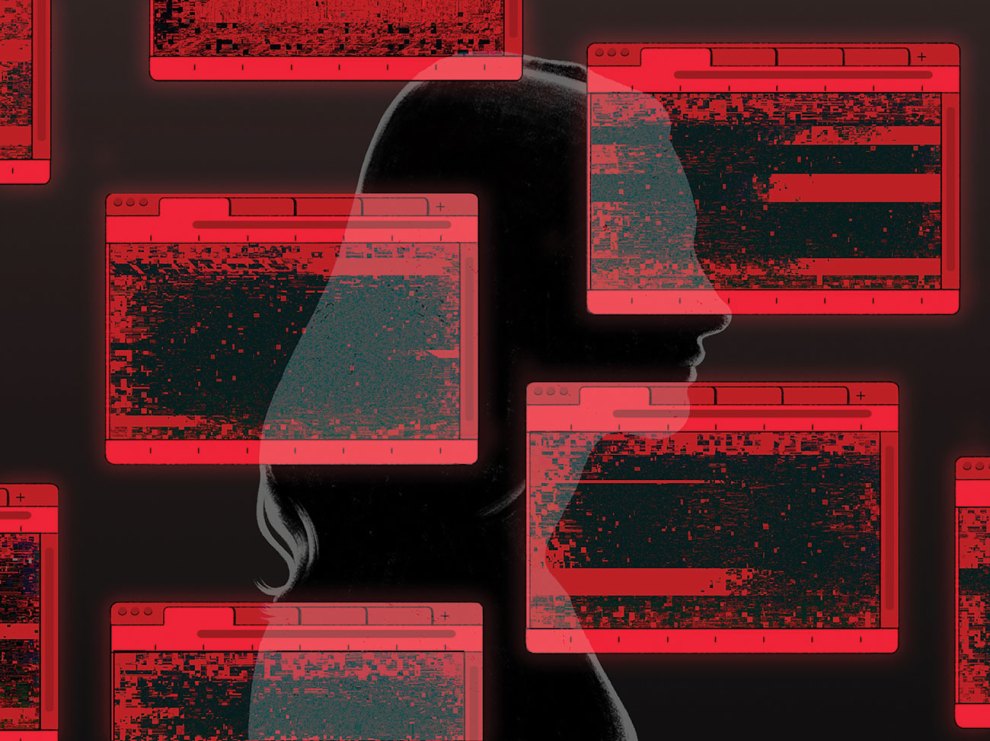
Sometimes it is not even clear how Kiwi Farms users obtain their information. “They somehow figured out where I worked. I don’t know how because I didn’t post it on LinkedIn,” Leal told me. A habitual refrain from survivors with whom I spoke was something along the lines of: “I don’t know how they found out [x] but…” The torment makes every action online feel like a risk.
“You’ll get followed for 5 to 10 years. Not every day maybe, but for years they will stalk you, and it’s this unending nightmare. And it’s designed to make you see that suicide is the only way out,” Liz Fong-Jones, a software developer and trans activist who was a target, told me.
“They want you to think that there is no other way to get out of the situation,” said Gerber, the video game industry archivist. Gerber recalled seeing Kiwi Farms posters discussing SWATing them in the hopes that police would kill their emotional support dog. “They were saying, ‘If her dog gets shot maybe she’ll kill herself,’” Gerber recalled.
If a target wasn’t already in a desperate situation, members of the Kiwi Farms community have tried their best to drag them there. “They find so-called Lolcows, who in general are trans or disabled and economically precarious. They want to un-employ them. They want to un-house them,” said Fong-Jones, “so that they are homeless, have nowhere to go, and will kill themselves.” Fong-Jones was harassed by Kiwi Farms for her support of Trans Lifeline. But because of the financial stability she attained working in tech, including an 11-year stint at Google, Kiwi Farms members could not destabilize her and got bored. Other targets of Kiwi Farms users told me the same thing—the most vicious stalking was reserved for the most vulnerable.
“A thing that really stuck with me is that they said that I probably wasn’t a Lolcow because I have a car. That left no question in my mind that their primary target is impoverished people,” a friend of Sagal, one of the victims who killed herself, told me. “They try to harm people who are too weak to fight back. They don’t want their victims’ families going after them. They want people who already lack social stability.”

Kiwi Farms users often refer to themselves as “autists.” This is helpful to remember.
On first glance, the forum can look ludicrously right wing. Racial epithets are common. So are slurs like “fag” and “tranny.” Misgendering is the norm. Fredrik Knudsen, who has observed Kiwi Farms for his internet-focused documentary YouTube series, Down the Rabbit Hole, noted that “there is an understood anti-trans feeling” across the community. “They believe it’s a sign of cultural degeneracy. It harkens back to their conservative bent,” he said.
But Knudsen thinks there’s something else happening beyond just ideology: “What draws people to the Kiwi Farms is difficult to place and is different for each person, but for a significant number of them, there are likely aspects of themselves that they see in the subjects of their derision,” he explained. “Many of the people on the boards (unironically) profess to have autism or struggle to maintain relationships with other people.” In conversations, the site’s targets told me they often thought the harassers’ similarities to their victims are part of the motivation. Take this comment from a 2015 thread partly justifying the harassment of Chandler:
When I worked at Kroger (which is a terrible idea for someone on the spectrum BTW) trying to fend off meltdowns was a daily, shitty experience. If it got particularly bad I’d sneak off to the restroom and self-injure, which actually broke a couple years being clean (something I haven’t accomplished since, sadly).
Another user responded:
Jeez, I’ve been lurking the site for a while, and all I see are a bunch of strange people with bizarre avatars talk about how they’re normal by their own standards and how autism isn’t an illness.
Kiwi Farms has threads with titles like “How to make friends,” “How do men make friends as adults,” and “Why are all of my friends slobs.” There are frequent posts about coping with having no close companions, working dead-end jobs, and overcoming severe loneliness and alienation. Like many of their targets, Kiwi Farms members often openly claim to be neurodivergent.
This can cause conflicts, especially when a poster acts too much like a target. Users have turned on each other for having characteristics that overlap with those of their victims. Famously, Anthony “A-Log” Logatto trolled one Kiwi Farms target so obsessively that fellow users started targeting him as well, dredging up his furry porn collection and Nickelodeon cartoon fan fiction. Kiwi Farms, according to Pless, who wrote for New York magazine about Kiwi Farms, reached a consensus conclusion that Logatto was so vicious because the original victim reminded A-Log of himself. If a community identical to Kiwi Farms existed, Kiwi Farms would probably deem it disgusting and troll it into the ground.
Kiwi Farms users see themselves as helpfully purging behavior they abhor—policing cringe. In 2013, an Indiegogo crowdfunding campaign for Sagal claimed that she needed lifesaving surgery for metal poisoning. Kiwi Farms posters claimed that the money was, in fact, intended for gender-transition surgery. The Indiegogo fundraiser was locked soon after. According to her friend, Sagal never received any money and didn’t create the crowdfunding effort. But Kiwi Farms members used the allegations to justify relentlessly antagonizing Sagal.
In other moments, members wield far more serious claims. In August 2021, Chandler, the site’s original target, was arrested on incest charges after an audio recording in which she claimed she had sex with her mother was posted on Kiwi Farms. Users quickly touted it as justification that their abuse of Chandler had been righteous all along. For a time, she was held in the men’s wing of the local jail.
The full story of these incidents, and how exactly they were brought to light, is not yet known, and may never be. For most Lolcows, people with scant online history, the preponderance of what exists about them on the internet is concocted by Kiwi Farms—a few real facts and old posts blended with lies, degraded by embellishment and exaggerations. The website’s users fixate on what is available. They assume and extrapolate. And they create a new narrative—flattening any complexities like a penny on a railroad track.
This is how a Kiwi Farms user once summed up the site’s ethos:
When you put something stupid/embarrassing/whatever on the internet, it’s on the internet forever. After you put it out there, it becomes ours. We own it. And if we feel like digging it up and laughing at it, we will. And if you decide to chimp out over that, we will love you for it with all our hearts, and you too will become ours. And when something is ours, it’s ours forever. We might get bored with it and put it down. We might play with it a little too hard and break it. But it never stops being ours, and someday in the future we’ll remember it, and pick it back up again. Would you like to become ours my dear?

Despite the growing outrage over Kiwi Farms, it stayed online because of the resolute stubbornness of Cloudflare. The company provides websites with internet services that help them run faster and protect them from cyberattacks. Historically, it has been reluctant to ban sites on free speech grounds. As Sorrenti’s fans amped up the #DropKiwiFarms campaign, CEO Matthew Prince likened such a demand to saying that a “fire department shouldn’t respond to fires in the homes of people who do not possess sufficient moral character.”
The company had buckled to public scrutiny before. In 2017, following the rally of white nationalists in Charlottesville, it banned the neo-Nazi site Daily Stormer. In 2019, following the El Paso massacre, it banned 8chan. Back then, Prince explained that decision by noting that the website has “repeatedly proven itself to be a cesspool of hate” and “has caused multiple tragic deaths.” He added, “Even if 8chan may not have violated the letter of the law in refusing to moderate their hate-filled community, they have created an environment that revels in violating its spirit.”
You could swap “8chan” for “Kiwi Farms” without changing any of the descriptions. Still, Prince at first resisted #DropKiwiFarms, writing in an August 31 post, “We do not believe we have the political legitimacy to determine generally what is and is not online by restricting security or core Internet services. If that content is harmful, the right place to restrict it is legislatively.”
But on September 3, 2022, after media began to cover Kiwi Farms in earnest, Prince flipped. He said that “specific, targeted threats have escalated over the last 48 hours to the point that we believe there is an unprecedented emergency and immediate threat to human life unlike we have previously seen from Kiwi Farms or any other customer before.” He called Cloudflare’s decision “dangerous” and “extraordinary.”
After the ban, Moon continued to provide updates to Kiwi Farms users on Telegram. SMAT analysis provided by Emmi Bevensee, a disinformation researcher, showed that Kiwi Farms had roughly 54,000 usernames registered. Hardcore members took to private channels to stay connected.
According to another researcher (who isn’t publicly authorized to share their findings), addresses associated with Moon and Kiwi Farms received 4.6 bitcoins between 2019 and 2021—worth more than $317,000 at bitcoin’s peak in November 2021. (In my own analysis of crypto addresses that Kiwi Farms has listed on its site to solicit donations, I found that it has also received tens of thousands of dollars’ worth of Ethereum since 2017.) According to that researcher, about half of the bitcoins sent to Moon and his site have passed through centralized exchanges—including Kraken, BlockFi, and Coinbase, which has a set of rules against inciting harassment.
Google has also played a role in helping Kiwi Farms persist. For people with meager online histories, a long Kiwi Farms thread can form a toxic digital first impression for employers or anyone else who searches their names. Even higher-profile targets were vulnerable. “One of the big things that hit me running for office is that when you Google my name, Kiwi Farms is one of the first things that shows up,” said Brianna Wu, a video game developer and former congressional candidate who was also a major target of Gamergate. “It’s hard when you have these people who create your reputation in a way that permanently damages it,” she added.
Google doesn’t often delist domains. In 2015, it briefly removed 8chan’s homepage from search results over “suspected child abuse content.” Google spokesperson Colette Garcia said in a statement that “we design our search ranking systems to avoid exposing people to hateful and harmful content if they are not explicitly looking for it” and “have policies under which people can request the removal of personal information from our search results, including doxing content,” but noted some things still get through.
Wu has tried to get Google to delist her Kiwi Farms results. “I’ve had five or six meetings with them,” she told me last spring. “It’s not something that they’ve taken serious action on.”
After Cloudflare dropped Kiwi Farms, Google responded to questions I’d sent a few days earlier. The company told me that since some of the information on Kiwi Farms might be factual, it is in the public interest to keep it in search results—even if other parts of the content are incorrect. And, in any case, a company spokesperson noted, “Google is not best positioned to make that determination” of truthfulness.
Kiwi Farms victims have had no better luck getting law enforcement to take action. “I’ve talked to the FBI. They’ll all do diddly-squat,” Darling said. “Law enforcement’s view is that you could live a normal life if you were willing to live a normal life, a.k.a. go back into the closet.”
When someone mailed Darling feces, she remembered it was a bureaucratic hell to attempt to report it to authorities. “We informed the police. The police said, ‘Call the postmaster general.’ The postmaster general said, ‘Call the FBI.’ The FBI said, ‘Call the Postmaster General.’”
Fong-Jones had a similar experience. “I contacted NYPD. I showed them Kiwi Farms threads. I said, ‘I’m afraid someone is going to SWAT me,’ and they were like ‘Get off the internet.’”
Getting local police or even federal agents to understand that entire websites of internet strangers are conspiring to cyberbully someone into suicide is a tall task. “I think that it’s easier for people to dismiss Kiwi Farms as simple trolls, because you can’t wrap your head around this level of evil,” Gerber said. “That’s why Kiwi Farms wasn’t shut down for so long. If you try to explain what Kiwi Farms is doing to you, you sound like a paranoid schizophrenic.”
Still, law enforcement may have looked into Kiwi Farms or one of its users. As far back as 2018, the website listed “warrant canary” text on the forum that told users: “We have not received any secret court orders or gag orders.” The message is now gone. It’s unclear what actions, if any, may have led to its removal.

In October 2022, six weeks after Cloudflare banned it, the Kiwi Farms website came back online. Fong-Jones explained to BuzzFeed News that “Joshua Moon has had to duct-tape together his own version of Cloudflare.” She estimated that he is “paying hundreds if not thousands each month now” to maintain Kiwi Farms, an unsustainable sum for him. To this day, the website flickers on and off—its users continuing to inflict harm and spread hate. On October 20, Gerber tweeted that after having a miscarriage, their parents had gotten texts and emails from Kiwi Farms members “celebrating their dead grandchild & saying how happy they are my parents will die without grandkids.”
Fong-Jones told me attacks on her had picked back up after she spoke publicly about her abuse. “They went after two of my colleagues,” she said, posting co-workers’ addresses and the names of their children and spouses to the forum. They also tried to smear her with a variety of made-up claims. “First they accused me of embezzlement,” Fong-Jones told me. “When that didn’t stick, they accused me of hacking,” eventually elevating their claims to bogus rape accusations.
In a Telegram post at the end of November, Moon thanked the community for “sticking around through the last few months,” saying Kiwi Farms traffic numbers were now rebounding. He explained that the site was still online through the help of Epik—which also provides services to sites including 8chan, Gab, and the Daily Stormer—and the Norwegian web host Terrahost.
Companies such as Cloudflare, Google, and others had the opportunity to lessen the impact of Kiwi Farms preemptively. They punted. Congress could pass stronger laws against online abuse. That seems unlikely. Law enforcement has the ability to pursue online threats. It seldom does. “I think we need the federal government to step in,” Wu said. “A lot [of the harassment] I got was unquestionably a crime. It’s a crime to tell someone every single day in lurid graphic terms that you’re going to murder them.”
Has the website with a kill count finally been killed itself? As the forum blinks on and off, the practices it honed continue to spread far beyond the confines of its pages. The forces that allowed it to thrive remain intact. Its users can flock to new platforms. After all, they shaped an internet that empowers them. And if that is the case, this question may be more haunting: Can Kiwi Farms ever die?
